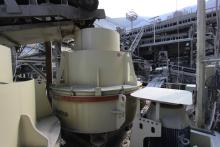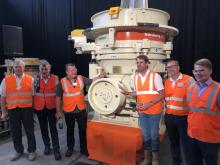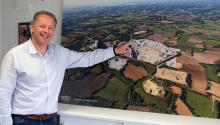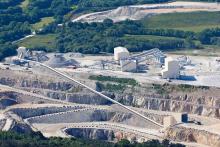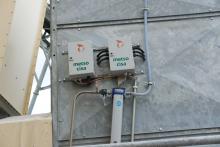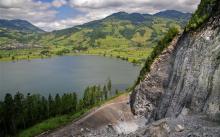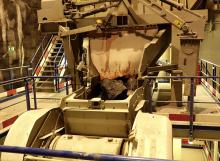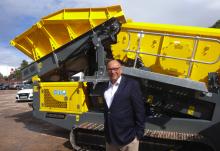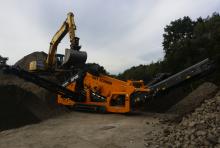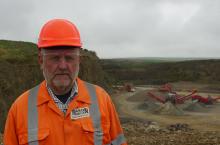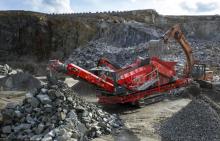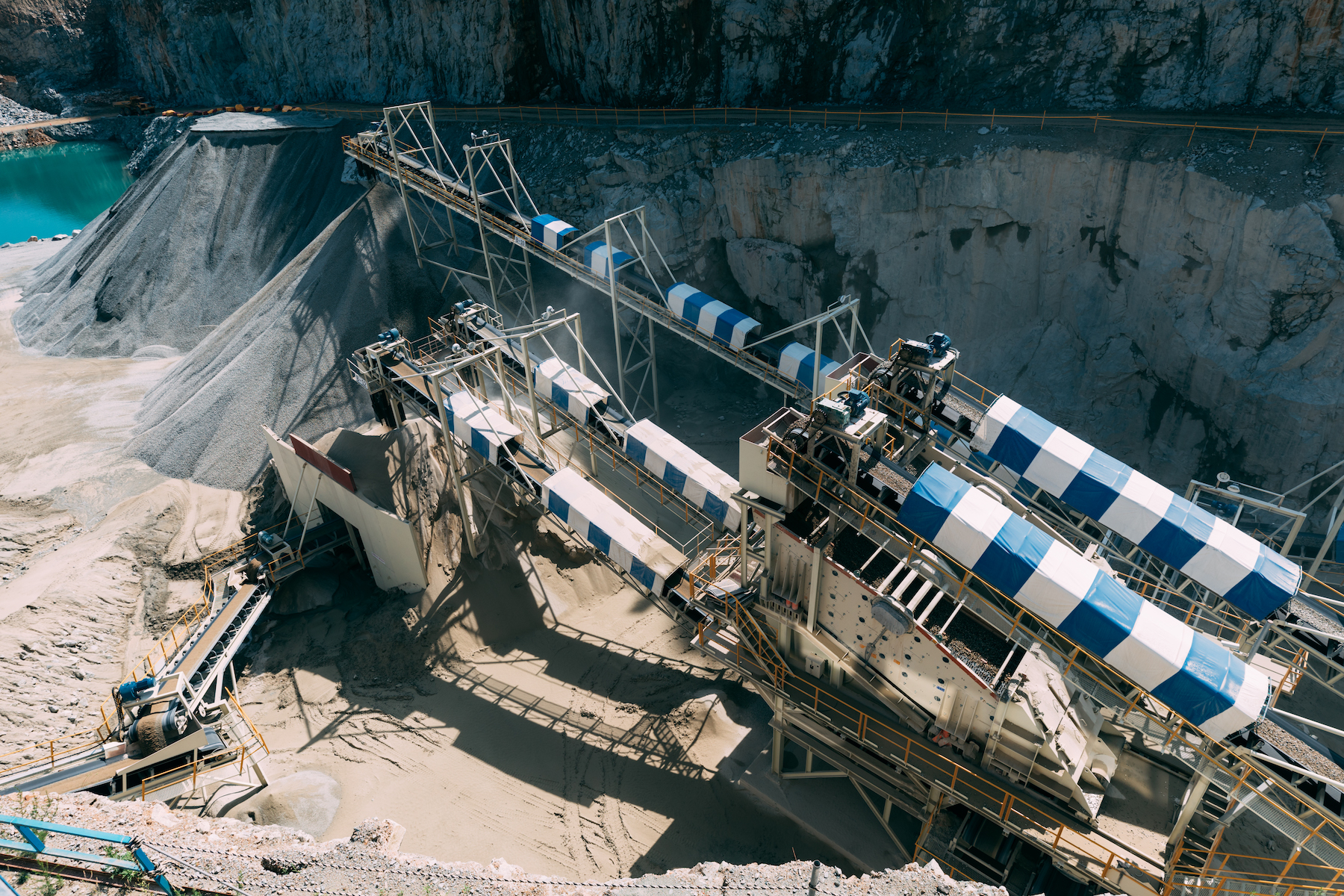
At its state-of-the-art quarry near the city of Gimhae in Gyeongsangnam-do, South Korea, Kyungboo is seeing significant productivity and efficiency gains in its manufactured sand and aggregates production thanks to the company’s major investment in Metso crushing and screening technology. Aggregates Business International editor Guy Woodford visited the site to learn more.
The scale of Kyungboo Quarry is impressive as you climb towards it, having turned off the main highway into Gimhae, a city of around 600,000 people in South-East South Korea.
The granite quarry named after its family-run owner company produces 2.2 million tonnes/year of manufactured sand and -25mm aggregates, with an even split between the two product groups.
Such vast output caters for Kyungboo’s large local residential construction and highways contractor customer base; it also fulfils a heartfelt promise made by Kyungboo’s smart and charismatic owner Park Sa Ick to his mother when just 16-years-old growing up in Sangju, around 200 kilometres north of Gimhae.
“Our family went through some tough times in the early 1970s as the South Korean economy had crashed. I came home from school one day in 1974 and saw my mother gathering stones from a small stream near our house so that she could try and sell them and make a little bit of money. From that moment I decided to become a big quarry owner so that my mother would never have to do this again.”
After graduating from university in 1982, the then 24-year-old Park secured a job at a Seoul-headquartered construction company. Keen to build a house for his family and fulfil the promise to his mother, he set about learning the skills required to run a successful quarry business, including a couple of years spent working on his company’s construction projects in Middle Eastern countries, more than 7,400 kilometres from his homeland.
“It was in the Middle Eastern countries where I began studying premium crushing and screening equipment, and I got to know many leading manufacturers,” explains Park. “I earned enough from my time in the Middle East to come home and start Kyungboo in 1985.”
Park’s and Kyungboo’s first quarry was situated in Busan, a large and affluent southeastern coastal city of around 3.5 million people around an hour south of Gimhae. “We rented the quarry and started processing 50 tonnes of aggregates an hour. We went from renting to buying quarries, with Kyungboo Quarry being our sixth quarry. We now process 850 tonnes an hour of material.”
Having enjoyed significant growth in its first 25 years and keen to cement its long- term success, Park decided in 2011 to start making plans for a substantial investment in new high-quality crushing and screening equipment. “I had been using South Korean crushers for 30 years but realised that they could not give me the volume and consistent quality of material that I now needed.
“I knew Nordberg was a premium crushing and screening name since my time in the Middle East. I discovered that the brand was now part of
In 2014, Kyungboo bought two Barmac B9100SE vertical shaft impact (VSI) crushers and an HP300 cone crusher for
manufactured sand production. In 2015, Park visited Metso’s cutting-edge manufacturing and R&D base in Tampere, Finland. After further discussion with Metso on his precise plant requirements, Kyungboo last year added a VF866-2V grizzly feeder, a Nordberg C160 jaw crusher, a Nordberg GP500S cone crusher, two HP6 cone crushers and two TS5.3 screens to his plant machine fleet, along with a Metso ICR automation system. Metso’s ICR system, says Park, is an important production consistency and monitoring tool. It also helps alleviate some of the difficulties Kyungboo faces in attracting young local employees to work in the quarrying sector.
For Kyungboo Quarry, Park has also purchased a Lokotrack LT120 jaw crusher as a standby primary crusher to be deployed with the quarry’s longstanding Korean secondary and tertiary crushing and screening equipment fleet during periods of particularly high aggregates and manufactured sand product demand.
A 40-strong team work at the quarry. The site works six days a week with shifts running from 8am to 6pm April to October, and 9am to 6pm November to March. At peak demand times, the quarry can operate an additional two hours each day.
For Kyungboo Quarry’s aggregates and manufactured sand production, a Furukawa HRC10-DS II rock drill is used to allow for the placing of explosives into the quarry face.
After blasting, Volvo EC750E, Cat 374 DL and Cat 374 FL crawler excavators and Cat 980M wheeled loaders are used to load Volvo A45G, A40E and A40 articulated dump trucks (ADTs) with -900mm sized granite material which is then transported to the quarry’s aggregates production plants.
Kyungboo uses a VF866 vibrating feeder, a C160 Nordberg jaw crusher, a GP500S crusher for secondary crushing, two HP6 cone crushers for tertiary crushing and two TS5.3 screens for its 0-8mm and 8-25mm aggregates products.
Some of the material to be processed into manufactured sand comes initially from 8mm-10mm sized material via the screening media aperture on the bottom deck of the two TS5.3 screens, which, after subsequently going through the two HP6 cone crushers, becomes -8mm material. Additional material comes from the scalping screen at the primary crushing stage which takes the product down to -40mm.
The -8mm material is put through washing screens, with material over 4.5mm going into one of the two Barmac B9100 VSI crushers. The material is then put through the washing screens again, and the screened -4.5mm material is washed out as manufactured sand.
The -40mm material goes into washing screens, with 4.5mm-13mm particles going into the other Barmac B9100 VSI, and 13-40mm particles going into the HP300 cone crusher for more crushing. The resulting materials from both the Barmac VSI and HP300 cone crusher then go to
a washing screen for separation. The -4.5mm particles are then washed out as manufactured sand.
Crucially, Park has noted that his production cost per m³ tonne of -25mm aggregate processed with his Metso plant is US$4.5 – as opposed to US$5.5 with his all-Korean made plant. This equates to over US$700,000 of production cost savings/year.
Meanwhile, Kyungboo’s production cost of manufactured sand is US$7 per m³ tonne with the Metso plant - as opposed to US$8.5 per m³ tonne with the Korean plant.This equates to more than US$1 million in production cost savings/year.
Furthermore, the company’s annual production of manufactured sand is 2.5-3 times greater with the Metso plant than with the firm’s South Korean plant; with one-and-a-half times more -25mm aggregates produced with the Metso plant than the domestic one. Park also notes that thanks to his Metso plant’s greater initial material feed volumes, Kyungboo Quarry now achieves 220 articulated dump truck-to-primary crusher material feeds/ day – compared to only 70/day prior to the company’s investment in premium crushing and screening plants.
Metso’s extensive crushing and screening solution for the quarry also solved problems Park and his team had experienced with their longstanding Korean primary crusher, which could not process some primary stockpile feed material via a small closed side setting (CSS). This meant Kyungboo could not produce enough material to keep up with increasing customer demand. Some bigger 400-500mm stones also often blocked the inlet of the primary crusher feeder, further restricting hourly material throughput. To counter this, Park had considered using a secondary cone crusher to initially reduce some of the larger feed material prior to it being placed on the primary stockpile for conventional jaw and then cone and impact crusher and screener processing.
In his well-appointed large office at Kyungboo Quarry, Park gets up and grabs a large folder containing documents relating to another major global crushing and screening OEM. After placing it on his office desk, he says: “Many of the big quarrying equipment manufacturers come here as they see how attractive the country is to do business in, and the demand for equipment that is here. However, the Korean customer places huge value on relationships. We only want to do business with people we know well and in who we can trust; people who listen to us and pay attention to the small things.”
Park is keen for Metso to open a major replacement parts warehouse facility in its Asia-Pacific region, which includes South Korea, but not China (other than Hong Kong). Currently, all replacement parts for Kyungboo and other South Korean quarrying firms’ machines come from either China or Europe – increasing Asia-Pacific region customer delivery times. Metso says it is currently examining options for an Asia- Pacific replacement parts hub.
The South Korean government has outlawed the use of natural sea sand in residential construction and commercial infrastructure projects. After coming into power in May 2017, president Moon Jae-in and his administration have also restricted the amount of new homes being built, claiming cash-rich, big profit-driven private landlords were buying up too many of them, pricing out younger first-time home buyers from the property market. However, Park says this year has so far seen a more relaxed government approach to the new building housing sector. Meanwhile, the government is also not renewing as many quarry operating licences, while making it much harder for any potential new operators to obtain one – clearing the field for the likes of Kyungboo to increase their share of what is, nationally, a 140m³ million/year (250-260 million/tonnes year) aggregates market.
“A combination of all these factors will likely see this company grow its manufactured sand output to around 80% of its total annual material production,” 59-year-old Park explains. “I think South Korea’s manufactured sand market will double in size in the next one to two years. The price per m³ of manufactured sand is set to rise from US$14 currently to US$18 in 2019, and higher in 2020.
“It is not easy to produce high-quality manufactured sand. It involves spending a lot of money on premium equipment.
Kyungboo is in a good position as we have already invested in premium plant, whereas many other quarry operators are still to do so.”
Park’s Kyungboo quarrying business is a truly family affair – with his wife, Kyungmi Shin, working as the company’s financial director since 1991. “I’m very comfortable working with my wife; we are a good combination. She is very good with money. I remember in 1997 when South Korea was in big trouble with the IMF (International Monetary Fund) and had its credit rating lowered. My wife helped insulate us with shrewd financial management allowing us to keep trading normally.”
While the volume of manufactured sand and -25mm aggregates products produced at Kyungboo Quarry may be substantial, the firm has always sold nearly all of its final grade materials to customers in and around Gimhae. “I am providing raw materials that are used to build the homes of Gimhae people - my people. I am helping put a roof over their heads. That means a great deal to me,” concludes Park, proudly.

